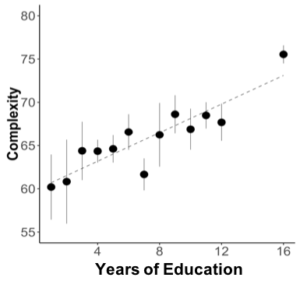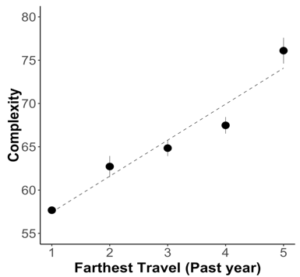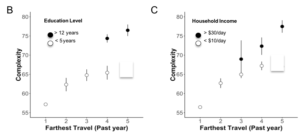Education and travel both increase the scope for more complex, novel stimulus to the brain. In turn the complexity of the brain EEG signal increases in complexity with both higher levels of travel and education.
In a previous blog post I showed the systematic relationship between stimulus consumption and complexity of the EEG signal [1]. What are the key stimulus drivers of EEG complexity?
Education and EEG Complexity
Education is probably the first stimulus type that most of us would think of – it increases the scope and complexity of knowledge we would otherwise typically encounter. Studies have shown that education is associated with increases in grey matter volume and improved cognitive performance ([2, 3] also see related post College in the Brain) . However, how does this reflect in the EEG?

Travel on your brain
Another key stimulus enhancing factor is travel. This has a very different kind of stimulus profile relative to education. Unlike education which is the formal study of the symbolic systems of literacy and numeracy and their didactic applications, travel is a fully interactive sensory experience that involves navigating new physical environments and potentially new languages and cultures and requires planning. There is much research on increased neurogenesis and changes in gene expression induced by placing rodents into more complex novel environments [4.5]. Travel is perhaps the closest natural stimulus equivalent in humans.

- – Never left home town
- – Traveled within a 100 km radius of hometown
- – Traveled beyond a 100 km radius but within state (in India each State has a different official language)
- – Traveled beyond a 100 km radius including out of State but within the Country
- – Traveled outside of the country (almost always >100 km)
This is of course only an ordinal coding where 5 does not explicitly mean 1 more than 4 but rather represents the next most complex category of travel.
Not surprisingly then, complexity was higher in each successive category. Thus more travel is associated with greater complexity.
Parsing out the effects of Travel and Education
Those with more education are also likely to travel more. In turn both are linked to income. It is thus important to understand if each has a distinct effect or is one driving the effect while the other is just a correlate along for the ride. It is of course, immensely difficult to have all the controls in living breathing human systems the way you can orchestrate in lab animals. However, the data provides some strong clues. Both high and low education groups showed the same increases in complexity with travel. Similarly both high and low income groups showed increases in complexity with travel strongly suggesting that travel has its own effect.

What does an increase in complexity mean?
This metric of complexity is relatively new and represents the diversity of complex waveform shapes in the EEG on the order of 100-300 ms which is the time scale of human perception. We don’t yet know a lot about its implications for cognition or other aspects of mental functioning. However, some initial studies have shown that it does a much better job predicting outcomes on a pattern recognition task than other related measures such as Sample Entropy and Lempel-Ziv Complexity. This means that this effects of travel and education reflects something cognitively meaningful – which is not surprising since both travel and education are associated with cognitive gains.
References
[1] Parameshwaran D et al., The Impact of Socioeconomic and Stimulus Inequality on Human Brain Physiology, Nature Scientific Reports, April 2021
[2] Boller B et al., Relationships between years of education, regional grey matter volumes, and working memory-related brain activity in healthy older adults. Brain Imaging Behav. 2016.
[3] Cox SR et al. Associations between education and brain structure at age 73 years, adjusted for age 11 IQ. Neurology. 2016;87(17):1820-6
[4] Rampon C et al. Effects of environmental enrichment on gene expression in the brain. Proc Natl Acad Sci U S A. 2000;97(23):12880-4.
[5] Bayat M et al., Enriched environment improves synaptic plasticity and cognitive deficiency in chronic cerebral hypoperfused rats. Brain Res Bull. 2015;119(Pt A):34-40.



















Hello,
as far as I am concerned the graphs contain correlational data, that should not necessarily have a causal relationship. Reasons for travel may differ and maybe people with more complex EEG travel more than those with less complex EEG for unknown reasons (e.g., being in a job that requires international travelling may require a more complex EEG).
This study has so many confounds I don’t know where to start.
Indeed, the complex nature of human systems where everything relates to everything and where humans cannot be controlled like lab animals makes it immensely difficult to control for confounds. Nonetheless it is our view that systemic trends that when viewed over time can be informative of the direction we are going. We would certainly invite suggestions for methods to parse out confounds in the study of evolving human systems – it is a difficult challenge.
Rien´s argument is correct. Most of the people I know that go for long distance travels are usually sharp persons (good example the jobs mobility). It seems a bit floppy to state that the travels are a cause of a bright mind, instead of the inverse: smart people are likely to have reasons to explore different places… You are right when stating that in humans is difficult to control the crossovers of variables; however, we have to be careful when setting our scientific hypothesis.
Indeed, it is likely to be a feedback loop. Smart people will venture further and in doing so will be exposed to more novel stimulus which increases their knowledge and ‘smartness’.